 |
HOME > PROJECTS |
|---|
| < PART 2 | - |
JOHN CROWELL POLLARD (1859-1906)
PART 3: Biography; Larceny: Plant Pots a Roman Coin; a Tragedian; Social Calendar!
PART 3: Biography; Larceny: Plant Pots a Roman Coin; a Tragedian; Social Calendar!
03 JULY 2021
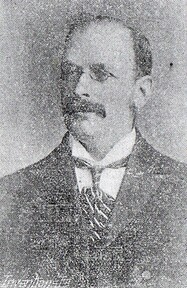
1. INTRODUCTION
I have found it fascinating how I have been able to find so much information about John Crowell Pollard predominantly relating to his business as a china merchant and his municipal role as a councillor for the Beacon Ward in South Shields. During my research, I have discovered several incidents connected to him 'cameos’ which add some divergence to this final section, 1896-1906, a biography.
My initial interest in John Crowell Pollard a maternal great, great uncle stemmed from a newspaper article (see Part 1) and an original document, that of the grave opening in Westoe Cemetery, South shields in 1901 for the internment of my grandfather, Alfred Ernest Young’s younger brother, Thomas Young in the grave of their parents Thomas and Sarah (Pollard) Young.
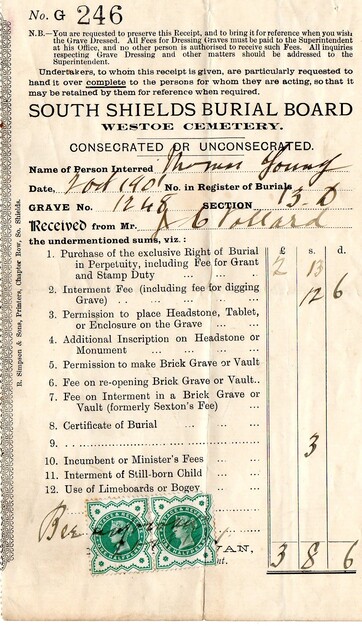
Shields Daily Gazette - 16th October 1897 (2)
The reason I have treasured this 'receipt' is because I have very few documents and indeed photographs relating to my mother’s ancestry; ostensibly, because a small brown suitcase containing memorabilia, which I would have love to treasure was mislaid some fifty years or so ago.
2 Profile
Born in South Shields on the 12th February 1859, John Crowell Pollard was baptised at St Hilda's Church on the 6th March when he was less than a month old. He was the sixth child of Sarah Crowell (1823-1885) and James Caddle Pollard (1826-1894), my great, great grandparents. He had two sisters and seven brothers, two brothers died in infancy, prior to his birth and his mother and sisters between 1884 & 1885.
His siblings were as follows:- Mary (Pollard) Nicholson (1845-1885); Sarah (Pollard) Young (1847-1884); George Pollard (1849-1909); James William Pollard (1852-1853); James William Pollard (1856-1906); Henry Pollard (1861-1914); Charles Edward Pollard (1862-1943); Septimus Pollard (1865-1954); Alfred Ernest Pollard (1868-1868).
When he was twenty-two years old, he was present at the death of his sister and my great grandmother, Sarah (Pollard) Young on Christmas Day 1883. My grandfather, Alfred Ernest Young only five years at the time often told me of this incredibly sad day recalling how the decorations on the Christmas tree had to be removed and the tree placed outside as mourning for his mother commenced.
By the age of 23, he had developed a business as a China Merchant. He married Adeline Mary Clarke (1863-1925), a schoolteacher at St Stephen’s Church on the 22nd February 1887.
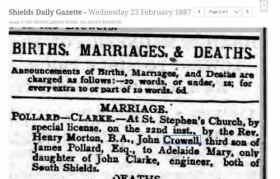
Shields Daily Gazette- 24th February 1887. (1)
They were parents to three daughters; Ethel Adeline Victoria Pollard (1887-1956); Gertie Emma Clarke Pollard (1890-1914) (1) and Elsie Christabel (Pollard) Ballard (1894-1956) and a son John Crowell Pollard (1897-1970). Only two of the siblings married, Elsie and John. Elsie married Richard Henry Ballard (1890-1960) and John, Dorothy Winifred Hazelwood (1896-1970), neither having any children.
ADDRESSES
They were as follows:-
1861: Queen Street, South Shields
1871: 20 Thomas Street, South Shields
1881: 20 Baring Street, South Shields
1891: 99 Baring Street, South Shields
1901: 3 Whitburn Terrace, South Shields
1904-6: 67 Rutland Gardens, Hove, Sussex
Queen Street running parallel to the north side of King Street and Thomas Street to the east side of Fowler Street are both still in existence; however, the few buildings of the 19th century still standing (Queen Street was heavily bombed during WW2) have been re-purposed as commercial premises.
Baring Street stretches from Ocean Road (original site of his china, glass and pottery business) to the Law Top and the River Tyne, it was built in part by James Caddle Pollard and his son George Pollard. Both of the houses where John Crowell lived are clearly identifiable especially number 20 as this is a distinctive double fronted property in a parade of single-fronted houses.
Whitburn Terrace was built in 1894, John Crowell was the first owner of Number 3, moving there with his wife and two eldest daughters.
1901 census for 3 Whitburn Terrace, South Shields

Between 1904 & 1906, according to Ward's Directory, Whitburn Terrace was assimilated into Mowbray Road together with other late Victorian terraces including Aberdare Terrace (Number 1 became 2 Mowbray Road) where my paternal grandmother, Hannah (Sharp) Thompson (1878-1953) lived and the address of my father, John Sharp Thompson (1913-1972) at the time of his marriage in 1940. Recently restored stone plaques, above the first-floor windows at the start or end of the terraces clearly identify the original names.
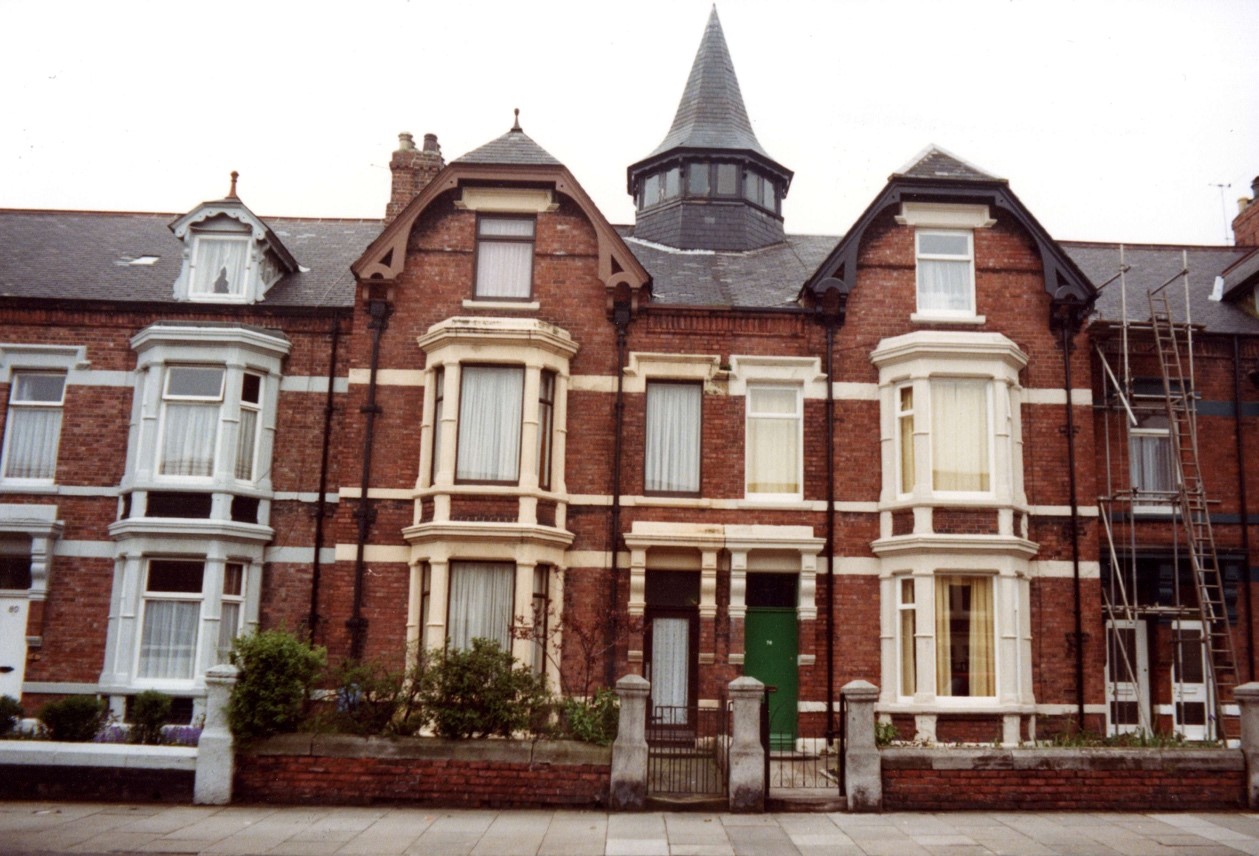
Whitburn Terrace in 2021 (2)
Number 3 Whitburn Terrace is to the right of this South Shields Library image; a three-storey house similar to the house right of centre. There is some confusion between sources as shown below to identify the exact house.
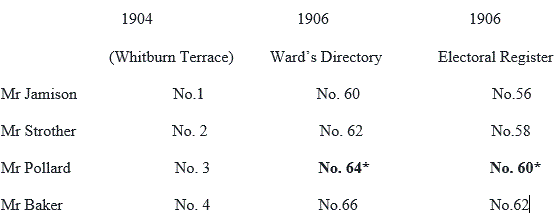
Up until 1910 the house numbers still differ in both volumes. It would seem therefore that No 3 Whitburn Terrace could be either No. 64 or No. 60 Mowbray Road. (3)
3 Larceny: Case of the 3 Missing Vases at 3 Whitburn Terrace!
The area in front of the properties in the former Whitburn Terrace are now laid out as small gardens with grass, stone/granite chippings or block-paving whilst a few retain the stylish Victorian tiling that would have been present when the houses were built about 1892. John Crowell Pollard as a China Merchant complimented the tiling with several decorated vases.
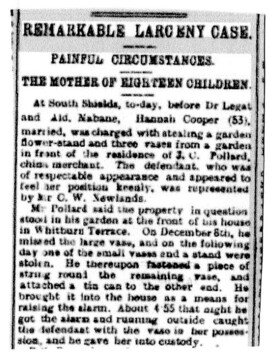
Shields Daily Gazette- 11th December 1896 (4)
He noticed on the 8th December 1894, that one of the largest vases was missing and the following day, that another of the vases and a stand were also missing. He decided to set a trap, fastening a piece of string round a remaining vase, and attached a tin can to the other end which he positioned in the house as a means for raising the alarm. About 4.55 that night, the alarm was raised and running outside he caught the perpetrator and ensured that she was taken into custody.
'REMARKABLE LARCENY CASE. PAINFUL CIRCUMSTANCES. THE MOTHER OF EIGHTEEN CHILDREN.'
This was the headline as reported in the 'Shields Daily Gazette' on Friday 11 December 1896' of the case brought before Ald. Legat and Ald. Mabane, at the ',South Shields Police Court. Hannah xxxxxx (53), a married woman, was charged with stealing a garden flower-stand and three vases from the garden in front of the residence of J. C. Pollard, china merchant of the value of 30 shillings (�150.00 in 2021).
Represented by Mr Newland, who explained that Hannah xxxxxx endured ill-health and had been treated by a Mr Gibb in Newcastle for four months or so for 'frightful pains' in the head. When questioned by the Aldermen at the Bench, she said 'that she was seized with an uncontrollable desire to carry it away’… and on the two following days she acted similarly. She did not try to hide her actions; admitting the theft on the 10th and telling the policeman 'that she had the others at home'.
Her husband in her defence said that there was no need for her to steal , she had a comfortable home, there was �8.00 in cash in the house as well as a bank account. He told of his wife's eighteen pregnancies and that only five of her children were living.
It is interesting that a comment was made by presumably Alderman Legat, (a medical doctor) that it was 'sometimes suggested that a woman at that stage of her life was, not responsible for her actions’ reflecting a possible diagnosis today of Kleptomania effecting women, possibly menopausal with underlying depression.
'Kleptomania is a type of impulse control disorder that's characterised by problems with emotional or behavioural self-control; whereby there is difficulty resisting the temptation or drive to perform an act that's excessive or harmful to you or someone else'. (5)
Although the case was deferred for two months on her husband entering into recognizances of �10 for her appearance in court again when called upon’. There is no further reporting so possibly John Crowell Pollard was compassionate and requested that the case should be discharged, and no further action taken (Shields Daily Gazette & Newcastle Evening Chronicle - 11th December 1896). (6)
4. South Shields Free Library and Museum
The library was in Ocean Road in the building originally the headquarters of the Mechanic's Institute and now the South Tyneside Museum. John Crowell Pollard was a member of the Free Library Committee; the following two reports are based on this of his many roles.
The Roman Coin
On Monday 22nd November 1902 at about 6pm he visited the library and museum checking the exhibits. He had cause to do so as he had donated a valuable Roman Coin; to his surprise he noticed that the coin was missing from the display case where it was housed so he called a librarian, and it was discovered that the hinges had been forced and several coins removed including a gold commemoration medal of Queen Victoria's Coronation. They contacted the police.
The perpetrator of the crime was Henry Anderson (23), a labourer, living in the Market Hotel in the Market Place. Wanting to quickly dispose of the coins, he went to the nearby shop of Mr Prinskey in King Street selling to him two silver medals tor 3 shillings at noon. However, he refused to buy another silver coin offered to him that afternoon and later still, he was offered the gold commemoration medal at which point he contacted the police.
Stolen coins were also sold to Henry Jackson, of Russell Street, for 2s 6d, two more at Levy's shop in Station Road for 5s 2d, and the Coronation medal was sold to Mr W. Grant, jeweller. King Street, for �2 10s. Mr Grant, (the most prestigious jeweller in the town) obtained receipt signed " Johnson, Market Place, Manchester."
By 8pm, an investigation was undertaken by Detective-Inspector Sanderson and he apprehended Henry Anderson at the Market Hotel. On their way to the Police Station in nearby Keppel Street, Henry Anderson became violent attacking the Detective-Inspector. Eventually Anderson was charged at the station and was found to have in his possession a gold coin.
When the case was brought before the court, the Town Clerk Mr J. M. Hayton prosecuted. Mr Edward Bailley, the librarian identified the coins which were sold, and they were returned to the Museum other than the Roman Coin donated by Councillor Pollard which was not found. Prisoner pleaded guilty and the Bench sent him to gaol for six months for the robbery and one month for the assault (Shields Daily Gazette & Blyth News- 31st October 1902). (7)
The Roman Coin in question may well have been discovered by John Crowell Pollard himself prior to the commissioned excavations of the Roman Station between 1875 and 1877 and the subsequent housing developments in Baring Street and the surrounding area. I suggest this dating because coins found before the excavations appear to have been retained by their owners and freely sold (Hodgson, p.10, 12 &14). (8)
Also see the 'People's Roman Remains Park’ for the excellent account of the 1875 excavations (Kidd & Stokes). He could have inherited the coin from his father, James Caddle Pollard who built part of Baring Street and as one of over thirty subscribers he donated half a guinea (10s 5p) towards the excavations of the fort in 1875 (Kidd & Stokes p.52). (9)
The Tragedian
In May 1899, Councillor Pollard had something of a coup (or perhaps not!) in securing for the South Shields Library in Ocean Road the deposit of a collection of plays written by Joseph Hinton Florington (1804-1850) a notable South Shields tragedian who died at the Long Row. His wife, Jane, born in South Shields survived until 1886, living for most of her widowhood in Thrift Street as a publican. She died in North Shields where she was buried in her husband’s grave.
'The books which have now come into the hands of the Free Library Committee were given the widow to a Mr R. Thompson, who was a personal friend of her husband, and through good offices of Councillor J. C. Pollard the family of Thompson have been induced make them public property'.
Both Florington's acted in theatres throughout the country and there are many reviews of their performances more especially Mr Florington who specialised in writing and performing in plays based on Shakespearian tragedies. He also wrote comedy as well as translating German operas into English. All of the plays deposited were autographed and some were ‘embellished with steel engravings from original drawings'.
Mr Florington's colleague Harry Beverley was part of a duo with Sam Roxby and it was he who leased theatres in North Shields, Durham, Stockton, Sunderland and in Wellington Street, South Shields (1792-1866) where the Florington's regularly performed. ''J Floridian, the tragedian who joined the circuit in 1836, was it's 'star' for many years, dying in South Shields on August 4, 1850'' (Hodgson, p. 456). (10)
There is potential for further research into the theatre of the early Victorian era, to catalogue and provide an analysis of the writing of J B Florington. Robert King in 1940 wrote in the Shields Daily Gazette articles about the Old Shields Theatres. However, it is worthy of note, that when his books of plays were deposited at the South Shields Library, they were in the majority, over fifty years old and many already obsolete (Shields Daily Gazette – 20th May 1899). (11)
5. Social Calendar
I have previously reported on the Civic & Philanthropic Activities of Mr J C Pollard, I am now including a rather eclectic collection of events he attended which may have enhanced his social status despite the fact that he was contending with the dismantling of his china business.
Statue to Queen Victoria
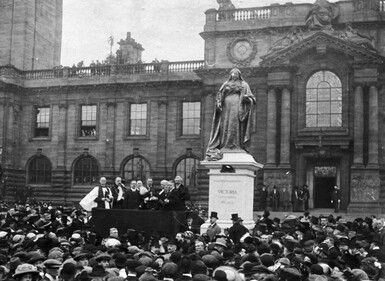
Unveiling of Queen Victoria Statue at Town Hall by Sir Hedworth Williamson 8 May 1913 (12)
The statue of Queen Victoria in South Shields was originally erected outside of the new Town Hall in 1913 before being removed to Chichester (site of Metro Station), where it remained during my formative years the to be relocated again outside the Town Hall. The cost of the statue of �1,000 was met by public subscription with two guineas donated by Mr J C Pollard. Amongst the contributors, I have noted Alfred Lawson, the widower of his niece and my great Aunt Sarah Pollard Young (Shields Daily Gazette - 6th June 1901). (13) His brother, Alderman J R Lawson is on the plinth.
Presentation at The Stag's Head
On Thursday at Messrs Metcalf & Sons, Stag's Head, Fowler Street, South Shields, Councillor J. C. Pollard presented to Mr George Hornby a massive gold albert and appendage (suitably inscribed), solid silver match box and a silver brooch for his daughter, subscribed by his many friends as a mark appreciation and esteem on his leaving the employ of Messrs Metcalf Sons, tar many years faithful service. Mr Hornby appropriately replied. The articles were supplied by Mr Thomas R. Prior, Fowler Street, South Shields (Shields Daily Gazette – 20th May 1899). (14)
This was of the 3rd Durham Volunteer Artillery at Trow Rocks, Mr J. C. Pollard presented prizes (presumably from his China Business) to Gunner, G. B. Dawson, aged 29 an electro-plated teapot; to Gunner G. Henry, aged 29, a tea set and to Corporal Simms aged 29, a set of vases (Shields Daily Gazette - 24th September 1902).
Rifle-like weapons with a barrel length of less than 20 inches are typically considered to be carbines. Weapons with barrels greater than 20 inches are usually called rifles unless specifically called carbines by the manufacturer. By this definition, many so-called “Assault Rifles” would technically be carbines. (15)
For further information about his interest in guns, see my web site 'Barnard Castle: Nostalgia and 20th Century Coincidences', nos. 5 &10
Tradesmen's Dinner at Westoe
'Last night under the auspices the South Shields Chamber of Trades the second annual dinner was held the County Hotel, Westoe' which was attended by John Crowell Pollard. Henry Pollard (Stationer) his brother, was a committee member as indeed was Arthur Crofton as secretary, his brother-in-law. Amongst the men present there were a clutch of municipal dignitaries including, Ald. Donald, Ald. Wardle, Ald. Readhead, Ald. Imrie, Ald. Rennoldson. The names of Mr John Barbour A. J. Wares and W. C. Grant resonate with me, as they were prominent business owners during my childhood with the former the founder of the world-renowned Barbour Corporation (Shields Daily Gazette - 12th March 1903). (16)
The British Empire Bazaar
This was held at St Aidan's Church and opened by Mr W Watson-Armstrong of Cragside, Northumberland and the Mayor Ald. J. R. Lawson presided and amongst the dignitaries present was Mr A T Flagg (father of Amy Flagg, South Shields premier historian) and Mr J C Pollard. The minister, Rev. L. D- Evans gave brief history of the development of the church and parish reporting that 600 children attended the Sunday School (Shields Daily Gazette - 21st September 1903). (17)
Recorded Events Attended with his wife, Adeline Mary Pollard
The Primrose League Excursion
The South Shields Habitation of the Primrose League had their first Excursion to Wynyard Hall, the home of the Marquis of Londonderry on the 12th August 1896 on a specially commissioned train for members and non-members including Mr & Mrs J C Pollard. Aldermen and Councillors were in attendance many with their wives. (Shields Daily News – 13th August 1896), (18). My paternal grandmother, Hannah (Sharp) Thompson was an early member of this South Shields branch, later becoming a life-long member of the South Shields Conservative Association.
The Mayor of South Shields Garden Party
This was held on the 31st August 1898 in the South Marine Park in John Crowell Pollard's Beacon Ward; he attended with his wife. 'On the invitation of the Mayor and Mayoress South Shields (Ald and Mrs J. Imrie), a delightful garden party took place at South Shields yesterday afternoon. This pleasing function has now come to be recognised an annual institution in most Boroughs in the north of England, and yesterday’s gathering, was the first at South Shields… There was large assemblage, the invitations accepted numbering about 600, including all the principal inhabitants of the borough and a number of visitors from neighbouring boroughs'. (Newcastle Journal & Shields Daily News – 1st September 1898). (19)
6. Relocation to Hove, Sussex
I have reviewed all of the newspaper clippings I have accumulated relating to John Crowell Pollard as a means of trying to establish potential reasons for his decision to relocate with his family to Hove in 1904. This was said to be on the grounds that this would be beneficial to his declining health; the assumption being that of his physical health. Although, he was particularly active in his municipal and philanthropic roles in the two years prior to this, his mental health may well have also been a significant factor.
Compulsory Purchase of 38 & 40 Fowler Street
The South Shields Street Improvement Act of 1900 had necessitated the closure in 1903 of his successful China and Pottery business at 36-38 Fowler Street. This would have had an impact on his life, yet it was perhaps the suggestion that his claim for compensation was excessive and unjustified emanating from the assumption of his prior knowledge of the proposal through his office as the Councillor for the Beacon Ward. This idea of 'insider dealing' must have loomed large over his well-being and that of his family for two years or so, challenging his integrity together with the inevitable 'tittle-tattle' he and his family would have endured; guilty yet clearly without evidence. Perhaps this was only to be expected in a small town such as South Shields.
At a meeting of the full council at the Town Hall, Market Place, on the 13th November 1899 a proposal already discussed on three occasions by the Town Improvement Committee was submitted for approval to be submitted to Parliament of a new Bill for the redevelopment of part of the Town. However, the areas considered were not disclosed and as Mr Stainton said, “We are going to Parliament for something new and we are now asked to vote for something we know nothing about”. The meeting was presided over by Alderman John Donald and attended by aldermen and councillors including Councillor J C Pollard who did not object (Shields Daily News - 14th November 1899). (20)
In the summary of the minutes of the business in committee of the South Shields Council, mention was made in August of the premises and businesses to be affected by the compulsory purchase of part of Fowler Street and adjoining streets. Objections had been received by four people including J. C. Pollard and although details of responses to three of them is detailed, this was not the case with regard to Mr Pollard. (Shields Daily Gazette - 30th September 1902). (21)
Presumably this was the stage, when his claim was to be rejected and the accusation of ‘insider-dealing’ was muted. However, in evaluating the advertisement below, he appears confident that his business would continue:
WANTED, LADY ASSISTANT for the China - Trade.—Apply J. C. Pollard, Fowler Street. (Shields Daily Gazette - 17th October 1902). (22)
To present a case for arbitration to clear his name would have taken several months. A period of stress, no doubt ensued. When he presented a claim for compensation to the South Shields Council it was ignored for which I can find no justification. It was only on the 21st June 1904 at the Station Hotel in Newcastle the arbitration case was heard before Mr Thomas Gow with the case found in favour of Mr Pollard; he was awarded �4,760 and his reputation restored see part 2). It was soon after this that the family relocated to Hove.
7. Retirement and Death in Hove
John Crowell Pollard lived with his family at 67 Rutland Gardens, Hove, Sussex in a highly desirable area which is currently one of the more expensive properties in BN3 5PD, valued at �1,180,000 (23). He had only two years of retirement, dying at the house on the 12th March 1906, at the age of 47 years.
Death Certificate
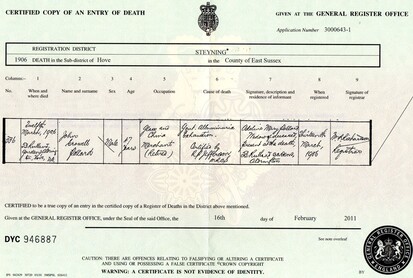
The death Certificate describes john Crowell Pollard's occupation as that of a Glass and China Merchant (retired) and the cause of death as Gout, Albuminuria (a condition probably emanating from the gout, of having too much protein in the urine which results from damage within the kidneys), Exhaustion. Adeline Mary Pollard, his wife, was present at his death. (24)
Notification in Shields Daily News
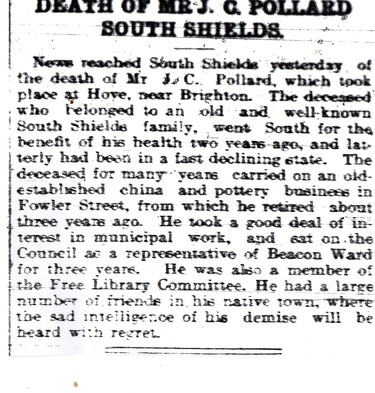
(Shields Daily Gazette - 13th March 1906). (25)
8. Comments
If John Crowell Pollard had the benefit of longevity and continued to live in South Shields, he may well have been appointed an alderman and even attained the position of Mayor of South Shields. He had some significant connections in the town which I have already referenced. At the age of twelve, in 1871, he was living with his parents at 20 Queen Street; their neighbours at 18 Queen Street were John Readhead (1814-1894), founder of the famous South Shields shipbuilding dynasty. It was Alderman Robert Readhead, son of John who funded the development of the Readhead Park in 1923.
1911 census for 67 Rutland Gardens, Hove, Sussex
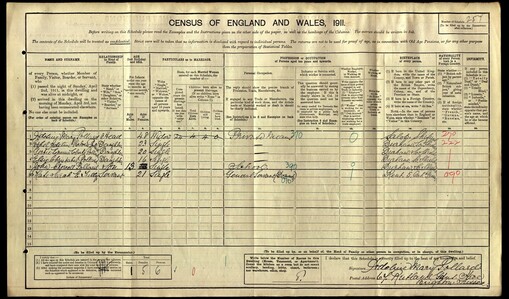
(Shields Daily Gazette - 13th March 1906). (25)
After the death of John Crowell Pollard in 1906, the family continued to live in Hove moving only once from the address at 67 Rutland Gardens to 29 Clarendon Villas.
We know that Adeline and at least one of her daughters, Gertie visited the North East in 1914 prior to the outbreak of WW1 including Barnard Castle which was a place where the family I assume visited for holidays. Sadly, during this visit, Gertie died of Phithisis Pulmonalisis (tuberculosis). (26)
I was appointed to a post teaching History at Baring Street Secondary School in 1969 and as I didn't own a car at that time, I well recall hurrying up the hill to the school from the bus stop in the town centre. I was oblivious to the family connections to the street as in recent times, I have discovered that several other houses had been occupied by people in my bloodline and that much of the street was built by James Caddle Pollard, my great, great, great grandfather and another of his sons, Geoge Pollard. The school was actually built on part of the site of the Roman Station (now called 'Arbeia') and it was only when it was demolished, that the modern excavations could commence.
Both the houses in Hove are still standing. There is a slight coincidence that Alex, my son, who manages this site now lives close to Hove. I hope to visit the cemetery where John Crowell Pollard and his wife are buried later in the year.
References
1, 4, 6, 7, 9,11,13,14,15,16,17,18,19, 20, 21, 22 25: Courtesy of British Newspaper Archive
2 South Tyneside Libraries: Ref. STH0004893
3 I am grateful to Catrin Galt for attempting to identify the exact house
5 Kleptomania-see Google
8 The Borough of South Shields: From the Earliest Period to the Close of the Nineteenth Century: by George B Hodgson, 1932
9 'People's Roman Remains Park' -David Kidd & Jean Stokes, 2020
10 Hodgson, et al
12 South Tyneside Libraries: Ref. STH0055274
15 Carbines-see Google
24 Death Certificate purchased by author 16th February 2011
26 See Post 'Barnard Castle: Nostalgia and 20th Century Coincidences'